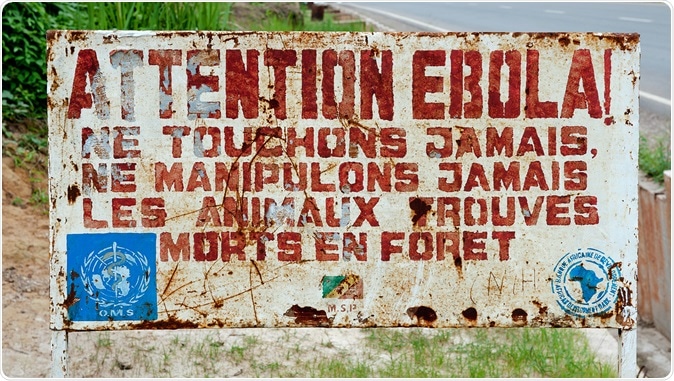Br Dr Ananya Mandal, MD
Congo is facing a new Ebola outbreak and the health officials have announced that starting today, (Monday 21st May 2018), response teams would begin administering an experimental Ebola vaccine in Mbandaka.
Mbandaka is a northwestern city with a population of around 1.2 million. There have been reports of some cases in this city. This is the first time urban cases are being reported in this latest outbreak. To prevent the spread of the deadly infection, the vaccination campaign has been launched.

A sign warns visitors that area is a Ebola infected. Image Credit: Sergey Uryadnikov / Shutterstock
Minister of Health Oly Ilunga in his statement said, “The vaccination campaign begins tomorrow, Monday, in Mbandaka, capital of the province. It will target, first, the health staff, the contacts of the sick and the contacts of the contacts.” Until now the current outbreak has killed 26 people the officials report. The vaccination would be administered initially to 600 people who were in direct contact with the infected persons including healthcare staff and the family members of the infected people according to Ilunga.
Mbandaka lies on the Congo river and experts believe there is a high risk of the disease spreading along the river pathway to other cities. The city is around an hour out by air from the capital city. The intense movement of people to and fro from the city poses a challenge in preventing rapid spread of the deadly infection that is fatal in one in two infected cases.
Over 4,000 doses of this experimental vaccine have already reached Congo from the World Health Organization. More are on the way. This vaccine is yet to be proven to be 100 percent effective and is still being tested. This vaccine was however proven to be a success in the West Africa where an outbreak took place a few years back. One of the major problems of using this vaccine in countries and regions specified is keeping the “cold chain” intact. This means that the vaccines should not, at any point, be exposed to temperatures higher than specified. Since infrastructure is poor in this vast, hot, tropical country, this is a major challenge. Exposure to higher temperatures can denature the vaccine and render them ineffective.
According to the latest statement from the health ministry, a total of 46 cases of hemorrhagic fever have been confirmed of which 21 have been confirmed to be Ebola and 21 to be probably Ebola. Four new cases have been reported and these are suspected to be Ebola as well.
Congo President Joseph Kabila and his Cabinet last weekend have agreed to treat this as a medical emergency and have sanctioned over $4 million to combat the situation. The Cabinet has agreed to provide free treatment in affected regions including special care of the Ebola infected individuals and their family members.
Robert Steffen, who chaired the WHO expert meeting a few days back said that there is a “strong reason to believe this situation can be brought under control” but the response needs to be prompt else, “the situation is likely to deteriorate significantly.”